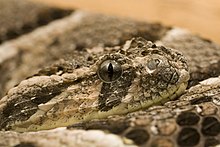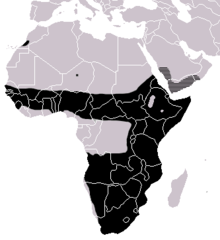Bitis arietans
| Bitis arietans | |
|---|---|
 |
|
| Scientific classification | |
| Kingdom: | Animalia |
| Phylum: | Chordata |
| Subphylum: | Vertebrata |
| Class: | Reptilia |
| Order: | Squamata |
| Suborder: | Serpentes |
| Family: | Viperidae |
| Subfamily: | Viperinae |
| Genus: | Bitis |
| Species: | B. arietans |
| Binomial name | |
|
Bitis arietans (Merrem, 1820) |
|
 |
|
| Distribution range | |
| Synonyms | |
|
Click to expand
|
|
Bitis arietans is a venomous viper species found in savannah and grasslands from Morocco and western Arabia throughout Africa except for the Sahara and rain forest regions. It is responsible for causing the most snakebite fatalities in Africa owing to various factors, such as its wide distribution, frequent occurrence in highly populated regions, and aggressive disposition. Two subspecies are currently recognized, including the nominate subspecies described here.
The species is commonly known as the puff adder,African puff adder, or common puff adder.
"arietans" = "striking violently" and is derived from the Latin arieto.
The average size is about 1m (39.3 inches) in total length (body + tail) and very stout. Large specimens of 190 cm (75 in) total length, weighing over 6.0 kg (13.2 lbs) and with a girth of 40 cm (16 in) have been reported. Specimens from Saudi Arabia are not as large, usually no more than 80 cm (31 in) in total length. Males are usually larger than females and have relatively longer tails. The head has a less than triangular shape with a blunt and rounded snout. Still, the head is much wider than the neck. The rostral scale is small. The circumorbital ring consists of 10–16 scales. Across the top of the head, there are 7–11 interocular scales. 3–4 scales separate the suboculars and the supralabials. There are 12–17 supralabials and 13–17 sublabials. The first 3–4 sublabials contact the chin shields, of which there is only one pair. Often, there are two fangs on each maxilla and both can be functional.
...
Wikipedia
